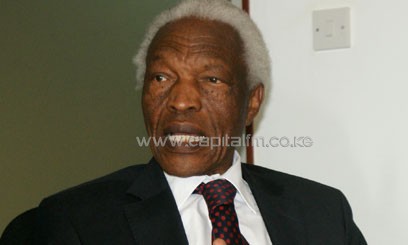| May 23, 2013

Kiplagat, who spoke to journalists on Thursday barely hours after he handed over the report to President Uhuru Kenyatta admitted that some of the report’s findings and subsequent recommendations were not in sync/MIKE KARIUKI
Kiplagat, who spoke to journalists on Thursday barely hours after he handed over the report to President Uhuru Kenyatta admitted that some of the report’s findings and subsequent recommendations were not in sync.
He seemed to echo sentiments expressed by other critics who have accused the TJRC of copy pasting the report from the works of past commissions of inquiry.
“If you read on Ouko, Wagalla and land, findings and recommendations do not tally,” he argued.
“He also said the commission will have a difficult time proving their case in court in case some of the accused take legal action.”
Already, most of those named have challenged the report while some have vowed legal action.
It can barely skip public notice however, that Kiplagat might have been expressing his concerns because he is among the personalities adversely mentioned by the report, which in some instances recommends direct prosecution.
“The procedure would be to ask the Director of Public Prosecutions by saying we have found some evidence and we think it is sufficient. You cannot just hand over a report and say prosecute,” said Kiplagat on Thursday.
The report implicates Kiplagat in the murder of Robert Ouko, who was killed in 1990 while serving as the Foreign Minister.
It states that Kiplagat was a key witness to events leading to Ouko’s death, something to which he maintains innocence.
“The allegation was that Ambassador Kiplagat was in possession of relevant information and that he had been present at certain events that might have been related to the assassination of the Minister,” argued the report.
Kiplagat, who ironically validated the report by signing it, is also accused of participating in meetings that led to the security operation that culminated in the Wagalla massacre.
According to the report, the doctor of philosophy had initially denied ever being to Wajir before he changed his position saying ‘he could not remember’.
“As it later became clear Ambassador Kiplagat had in fact attended a meeting of the Kenya Intelligence Committee in Wajir on February 8 1984, less than 48 hours before the start of the security operation that resulted in the Wagalla massacre,” stated the report.
He in addition faces accusations of being a beneficiary of illegal land transactions, a claim which he also denies.
The TJRC report declared that Kiplagat was unfit for public office but the diplomat maintained that he would remain in office because he was ‘innocent until proven guilty’.
“And we should not be stepping outside of our jobs if something has come up unless it is very serious and the due process of law has been followed. I followed the law and it is the court that actually asked me to come back,” he argued.
He also revealed that none of the TJRC Commissioners were involved in drafting the actual report and that it was handled by technocrats.
Kiplagat, who chose to converse with journalists unaccompanied by fellow TJRC Commissioners and away from the TJRC headquarters, interestingly defended the report saying it should not be drowned in the works of other commissions.
Among those named in the report is the president himself, his deputy William Ruto, former Vice President Kalonzo Musyoka, sitting and former Members of Parliament.
And while the report continues dominating news headlines, what remains to be seen is whether or not its recommendations will be implemented with human rights crusaders hoping that it doesn’t end up on a shelf next to other past reports gathering dust.



No comments:
Post a Comment